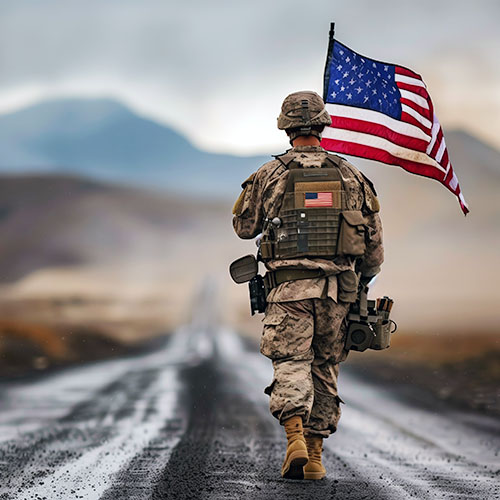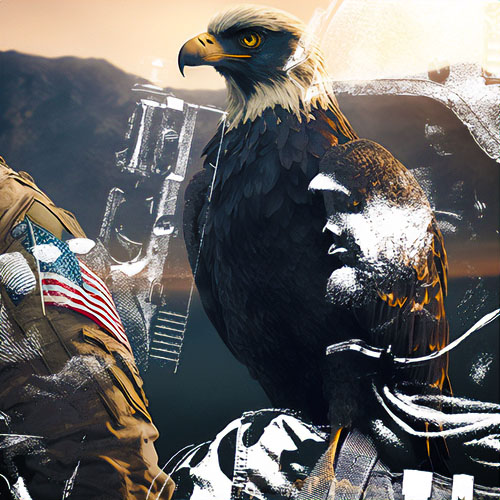Soldiers and veterans serve as conduits to war in modern times for the American public. What does that mean in the moment? A lot of different things, it turns out.
War is hell, but that’s not the half of it, because war is also mystery and terror and adventure and courage and discovery and holiness and pity and despair and longing and love. War is nasty; war is fun. War is thrilling; war is drudgery. War makes you a man; war makes you dead.”
The great Tim O’Brien wrote that in The Things They Carried, his groundbreaking short-story collection about the Vietnam War. It’s been a couple years since I last revisited that book, but I was brought back to those lines recently when I traveled to rural Oklahoma for the wedding of one of my former soldiers, Smitty.
It’s been ten years since we served together in a scout platoon in Iraq, a number that defies memory, but there it is. Some days it feels like yesterday that we were walking the sand alleys of the sectarian villages north of Baghdad. Other days, it feels like a few years back—but a decade?! Naw, a decade ago would mean we’re old now. And that can’t fucking be.
A third soldier from our scout platoon, Chris, also attended the wedding. He’s been on two more combat tours since ours, and is still in the Army. Over some post-ceremony beers, he discussed the mind’s slipperiness of time, and why he still serves. “It’s always there, you know? Every day, every minute matters over there. It’s not the same in the States.”
Wise words from a career military man.
Hell. Mystery. Terror. Holiness. Death. All of that and so much more. As any military veteran can tell you, reunions like we had at Smitty’s wedding can be balm for the soul. I’ve spent a lot of my life since Iraq writing and reasoning and reckoning with what we saw and did. Many vets—most, really—don’t get that.
I’ve been blessed to tell our stories. Some vets don’t want to look back at that part of their lives, choosing instead to pack it all in and go forward that way. To each their own, of course. But even for an oversharer like me, there was something really freeing about trading old war tales with the men who were there beside me back when.
Our first firefight. The night with the IED emplacers on Route Lincoln. The time we rolled up on a post-car-bomb scene and found wild dogs licking up the scraps of a dead sheik. The wild, manifold smells of the desert. The tinny, mechanical sounds of the outpost. The scattershot images of the Iraqi soldier bleeding out on the examination table in the medic station, despite everyone doing everything they could, trying their absolute best, before the medevac got there.
Those missions and patrols have lingered with me for a decade now, and aren’t going away anytime soon. Turns out they’ve lingered with Smitty and Chris, too, and that shared understanding and experience (plus a few Bud Lights) loosened something in us all.
It felt like church, to be honest.
We tried not to dominate the after-wedding celebration, but we probably did. I feel bad about that now.
There’s danger in this kind of talk, though, talk soaked in good nature and fuzzy nostalgia. Time’s eased the burden of the moment. We know how the stories end: We live. Most of our friends do, too. As I watched others from the wedding gather around our table, listening in because they cared (a good thing, of course), I realized this was a microcosm of how modern America interacts with war.
War is something that happens over there, to other people, in other places. It’s foreign, both geographically and figuratively. So we three vets—me, Smitty, and Chris—our stories were conduits for everyone else. There’s power in that. There’s responsibility, too. How to talk about our time in Iraq without mystifying it, without romanticizing it?
It’s a fine line to walk. We all did our best, in our ways, I think. Telling it straight and honest and keeping it more light than heavy, given the circumstances.
Was that the right call, though? Tim O’Brien has another passage in The Things They Carried about this very dilemma. (Because of course he did.)
“A true war story is never moral,” he wrote. “It does not instruct, nor encourage virtue, nor suggest models of proper human behavior, nor restrain men from doing the things men have always done…. There is no rectitude whatsoever…. You can tell a true war story by its absolute and uncompromising allegiance to obscenity and evil.”
I didn’t think of that passage at the wedding, only later. And it’s probably for the best, as there were kids around and their parents probably wouldn’t have appreciated my insistence on cursing while exploring the philosophical nature of men and evil. Still, it’s a complicated thing, and something that military veterans across America wrestle with when their friends and family ask them for a story, for a sense of life overseas, for a piece of over there.
Give what you can but nothing more. That’s where Chris landed, a couple hours and a few beers later, when everyone else had gone home and it was just the two of us, shooting the shit in the restaurant corner. Because he’s still in the Army, he’s more focused on what comes next than what happened.
“It’s all back there,” he said. “Not saying I don’t think about it, because I do, and it’s good to. But you can get stuck back there, if you’re not careful. It happens. I’ve seen it. They get stuck, brother.”
I wrote that down in my phone. It’s a good line, I thought.
I should use it in my next column.
“Hey,” I said, pointing to my phone. “Wanna call some of the guys?”
I meant fellow soldiers like C-Well, and Prime, and wild-ass McClure. We’d been talking about the other guys from our platoon all night—where they’d been, what they’d done that short decade ago. Inspired by Chris, I wanted to hear more about what they’re doing now and where they’re at. We both knew a little bit of their lives from Facebook. But that’s not real life. That’s not their voices. That’s not their now.
“Love it,” Chris said.
So that’s what we did.



















